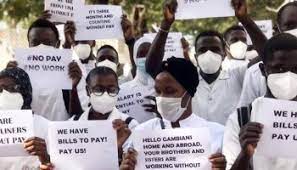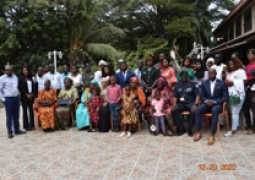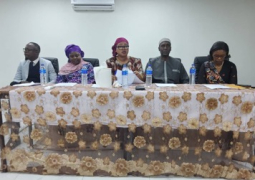
The Gambia Nurses and Midwives Association yesterday commenced a three day sit-down strike amid non-payment of allowances.
The association, in a release, said: “After thorough analysis of the payments made by the Ministry of Health, the National Executive Committee arrived at the obvious conclusion that the Ministry's decision to pay a handful of nurses was targeted to halt the sit-down strike rather than address the entire situation. Having had more than 100 days to honour the agreement brokered at the State House with SG and Head of Civil Services, Ministry of Health has no genuine excuse for not meeting the agreed deadline for payments to be disbursed.”
“From 11th May – 31st August, 2021 was enough time if it really mattered to them. The sit-down strike will be in two phases; however, it will continue until all nurses are paid. Phase one will start from 1 to 3 September, 2021. All departments will close except the Emergency Department, Labour Ward, Dialysis Unit, ICU, Neonatal Unit, and Operating Theater, while all other departments should not report. On phase two, there will be complete sit-down strike! No nurse in The Gambia will report to work.”
Meanwhile, executive members of the association confirmed that some nurses received their allowances. However, they added that a large number of the nurses didn’t receive their allowances. They also dismissed reports that the strike is politically motivated.
Speaking during a press conference yesterday at the Arch in Banjul, Ousman Touray, the secretary general of The Gambia Nurses and Midwives Association, said: “The reason for calling for the press conference is to let Gambians know the content of which nurses are being treated in this country and the conditions of which they work and also to make some clarification on the statement make by the health minister,” he added, claiming that there’s no single health facility in the country without a nurse.
The working conditions of nurses and their remunerations in the country, he claimed, are ‘sad’. “Nurses are unpaid and under protection against infection, under protection against working colleagues and they are under protection even against the public. Nurses work almost 12 hours and spend only four hours sleeping and the rest with their families.”
“If the Ministry of Health wants to achieve universal health coverage and give quality care to the nation, it needs to be brave enough to face the reality and speak the reality and do the reality to achieve the reality.”
The only allowances initiated by the Ministry of Health, he added, are allowances initiated by the minister himself, doctors that have moved from clinical areas to the main ministry and PhD holders.
“Cognizant of the fact that some of the nurses’ allowances are just one hundred or two hundred dalasis, we made a proposal and sent it to the Ministry of Health. The said proposal was taken bilateral at the PMO. The PMO rejected it because it was not properly defended. This was because nurses were not properly represented at the bilateral,” he noted, while claiming: “The ministry claims that the government couldn’t implement the allowances because the government was short of resources.”
The allowances they were requesting, he explained, were not too much. “A nurse attendant should have an increment not more than D2000, a SEN Nurse should have an increment not more than D3000 and a RN should have an increment not more than D4000. This is a small amount of money that definitely needed no problem,” he posited, adding: “The amount of allowances allocated for the minister, doctors and PhD holders could have even paid the entire nurses.”
Eighty percent (80%) of health care delivery, he went on, are made by nurses and midwives, noting that because of the care they have for Gambians, the protest has been staged in phases.
“We want to send a message to the ministry that if they care about us, let them settle our allowance issues. However, if they fail to honour this agreement, there will be a total shutdown of nursing healthcare services in this country. This is the position of nurses and midwives of this country, while warning that threatening the nurses is not a wise decision a leader should make.
Yusupha Sanyang, the president of The Gambia Nurses and Midwives Association, said “If the ministry cares about the health of the public, they should honour the agreement and make sure that every nurse who is supposed to receive these allowances receives the said allowances from today to Friday.”





